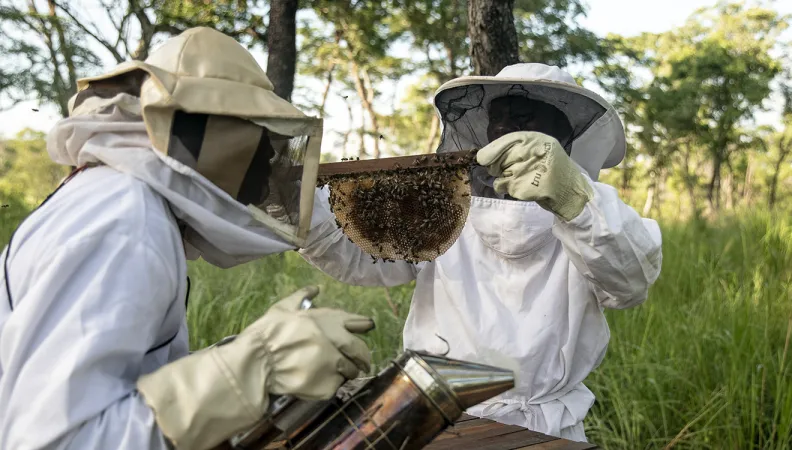Share the page
Biodiversity Degradation: 3 Risks for Finance
Published on

Damage done the environment has an impact beyond the natural world. It poses potential problems to financial institutions and consequently to individual savers and entire economies. Nature and finance are more interconnected than we think, and the degradation of biodiversity is forcing financial institutions and governments to cope with new risks posed by the environmental fallout. We look at three fundamental risks.
According to the World Economic Forum, nearly half of the world's GDP is linked to biodiversity, that is, healthy ecosystems that can provide services such as clean water, crop pollination, and crop pest control. However, many economic players do not realize that the damage they are causing to nature could soon have disastrous consequences. Animal populations have fallen by an average of 68% between 1970 and 2016, while one in eight living species is threatened with extinction.
See also: AFD’s first TCFD Report on Managing Climate-Related Financial Risks
Financial institutions - banks, funds, insurers and private investors - could be among those to bear the brunt of this, as well as savers who entrust their savings to them. While the focus of finance has been on climate risk, their interest is now beginning to turn to companies' dependence on biodiversity.
Three major risks have been specifically identified.
Physical risk
Many businesses directly depend on services provided by nature, such as supplying drinking water or wood or maintaining arable land. But a small break in the long chain of production can cause a breakdown. This is known as physical risk. "The pollination provided by insects makes it possible for a certain number of agricultural activities to be maintained. When this service is no longer as stable as before, such as if there are fewer pollinators during certain years, it is more difficult to anticipate economic activity and the repayment of loans by farmers,” says Julien Calas, an AFD researcher specializing in biodiversity. “Financing these parties becomes more risky than before.”
Similarly, numerous manufacturing processes in food industries rely on a constant water supply. If the quality or quantity of the latter is not up to par, the resulting economic activity is disrupted – as are the investments in the sector.
"When we take a closer look, all our economic activities are more or less dependent on a stable state of nature,” says Julien Calas. “We are physically dependent on biodiversity.” According to a recent study by the Banque de France with AFD, 42% of the value of shares and bonds held by French financial institutions are issued by companies that are highly dependent on at least one service tied to an ecosystem. And this figure only takes into account these companies' direct activity, not that of their suppliers. When these upstream dependencies are assessed, all actions and obligations turn out to be dependent - if only slightly - on the services provided by living things through their value chains.
However, banks are not yet collecting data that would allow them to assess the impact of biodiversity decline on the creditworthiness of their customers. “This is a threat to financial stability,” said Etienne Espagne, an economist at AFD. The financial sector, especially regulators, must take an interest in these issues. They have an important role to play”.
Transition risk
The more a company has an impact on biodiversity, the greater the probability that one day a government will establish a new standard, or that consumers will seek alternatives, forcing it to modify its practices or risk finding itself in great difficulty. This in turn is likely to expose the banks, funds and insurers financing these companies – known as transition risk.
In May 2019, in the Netherlands, which has long struggled with excess nitrogen in the air, soil and rivers largely from intensive livestock farming, the Dutch Council of State established strict new rules that led to the suspension of operating permits for the most nitrogen-emitting activities. From one day to the next, some farms were no longer authorized to work and became insolvent for the banks.
"Physical risk and transition risk are mutually reinforcing. The greater the physical risk, the greater the justification for transition,” says Julien Calas. “Conversely, the longer a transition is delayed, the greater the physical risks involved.” Financial institutions today must therefore be able to assess their customers' exposure to risk as well as possible changes in consumption and regulations.
Reputational risk
Even before a new regulation is put in place, or a service provided by nature becomes unavailable, a company can be criticized for its practices, which can take the form of a consumer boycott, stock market collapse or business stoppage. This is known as reputational risk.
"The reputation of institutions can be damaged if, for example, they are linked to financing palm oil companies whose activities contribute to deforestation and the extinction of animal species,” a study on the Dutch financial sector found. “At some point the public may realize that a business is really harmful to the environment and will turn its back on it. But this is something that can be anticipated.” said Julien Calas.
Increasingly, public and private initiatives are seeking to to measure companies' impact on biodiversity and change their relationship with nature. A job that has only just begun.
